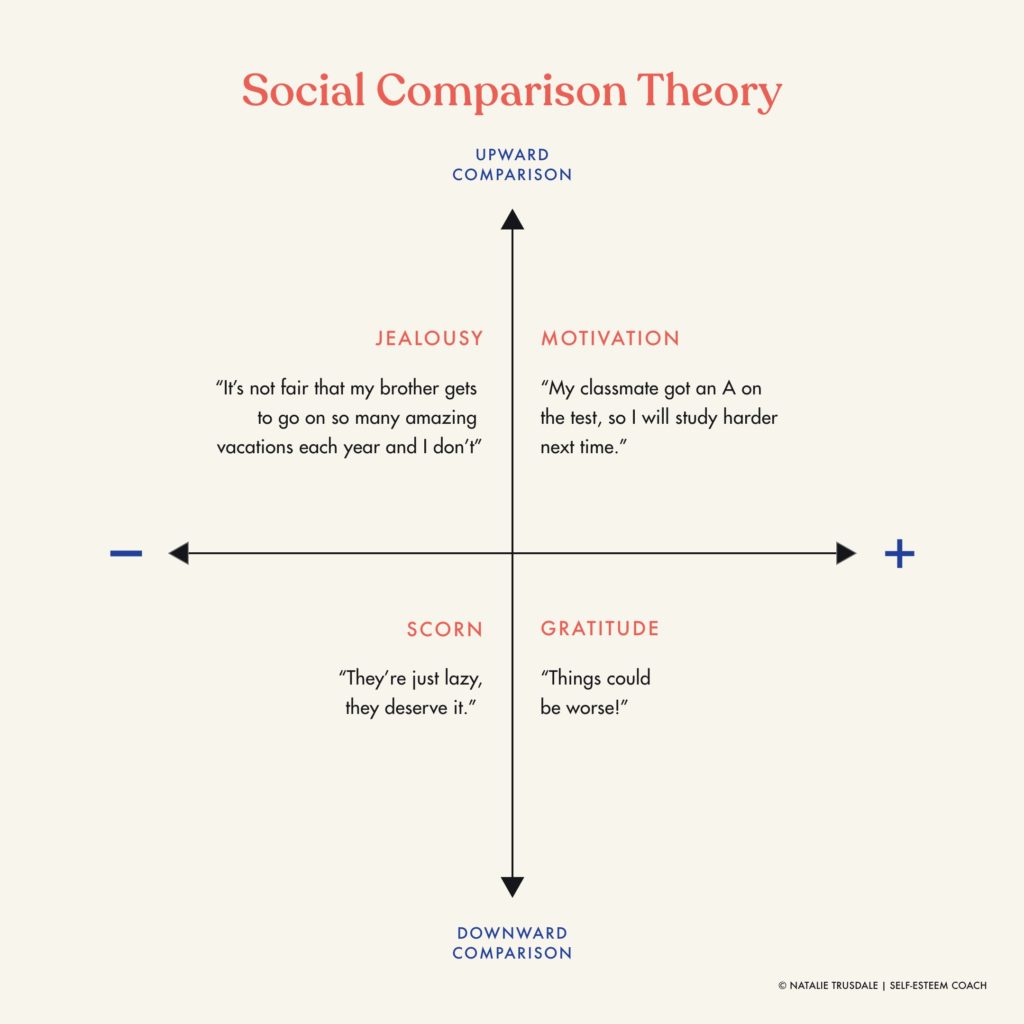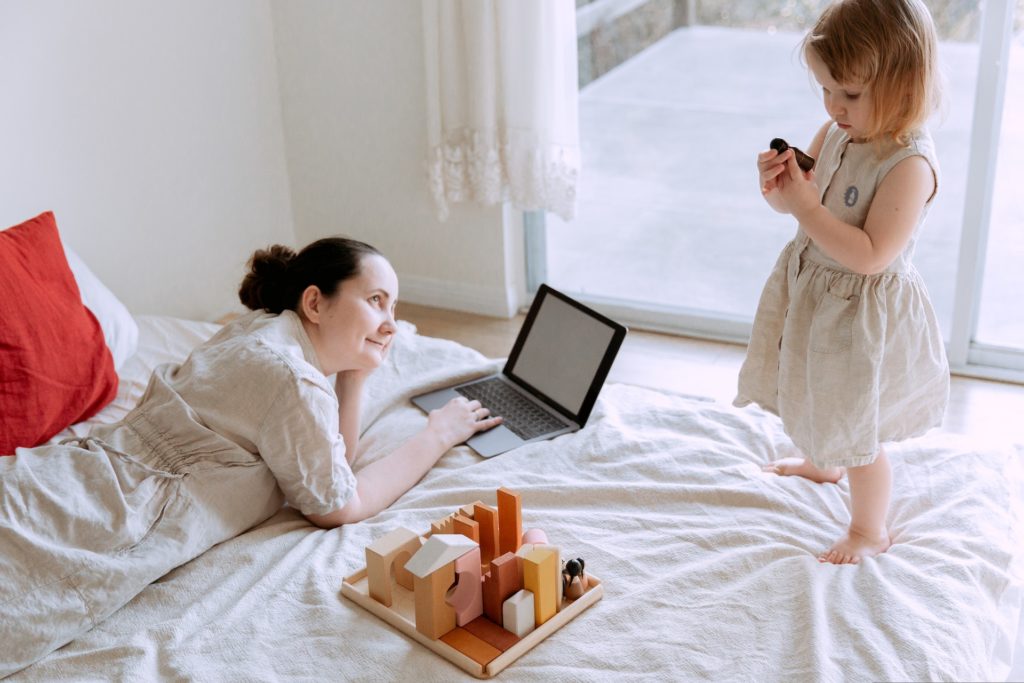Ever compared yourself to someone else? If your answer was yes, you’re not alone, 88% of women compare themselves negatively to others.
Social Comparison Theory, developed by Leon Festinger in 1954 stated that individuals determine their own social and personal worth based on how they feel they ‘stack up’ against others. So, in a world where so many people are comparing themselves negatively, what impact is that having on how we feel about ourselves?

Comparisons can be used by some as a motivator, but for most women its main outcome is low self-esteem, poor body image and reduced happiness. So today lets explore why we get trapped in negative comparison cycles and how we can protect ourselves from the dangers of social comparison.
How do you compare yourself?
When we compare ourselves we are generally doing so either negatively or favourably, so based on social comparison theory we are either evaluating that our worth is less than, or greater than someone else’s.
There are many ways we compare ourselves but common areas include:
- Body image
- Relationship status
- Clothes
- House
- Car
- Job
- Skills and Abilities
But have you ever stopped and thought about why you do it or how it makes you feel?
Negative body comparisons are a big issue when it comes to your self-esteem and something that we all seem to do without a passing thought about how it affects us! It’s become normal to do it casually in conversations with friends over coffee or while snuggling with our partner while watching a movie on a Friday night!

So I want you to stop for a second, yep, I mean pause right now while you’re reading this and ask yourself these 4 questions
- Who are you comparing yourself to?
- What are you comparing?
- Why are you comparing yourself?
- How does it make you feel?
Often we are comparing ourselves to people we see online, which has caused an increase in mental health issues and a decrease in self-esteem for those often using social media.
Our reality becomes skewed by airbrushing, filters and photoshop apps, so often we are comparing ourselves to unrealistic, unattainable and unreal images of other people and their lives.
“Don’t compare your behind-the-scenes to someone else’s highlight reel” Steven Furtick
Even walking down the street we torment ourselves by comparing ourselves to other women, reaffirming to ourselves that we aren’t enough and that we don’t ‘measure up’.
Do you realise you’re doing it? I bet if you made a note of every time you compared yourself today you would be shocked! Try it, it’s an eye opener!
So, why do you do it?
Here’s the problem, every day we subconsciously chip away at our self-esteem and self-worth without really knowing we’re doing it. It’s become the normal for us, we talk about it with our friends and slowly build a comparison culture where its ‘okay’ to wish you were someone else and to focus on the areas of ourselves we don’t like very much!
Have you ever got ready for a night out and felt good, but then had a quick flick down social media and all of a sudden it starts, ‘she is so much prettier than I am’ or ‘she looks stunning and I look a mess’, and then we look back in the mirror and don’t see ourselves in the same way. We start touching up our make up or frantically getting changed before the taxi appears! We get anxious and focus in on all the bits we don’t like about our appearance, it becomes all we can see and our mood and behaviour changes, and not for the better.

You see every time we compare ourselves to others it reinforces negative beliefs we hold about ourselves. Negative beliefs that are always with us and have developed as a result of our personal experiences, role models growing up and our environments. They shape our values, attitudes and perceptions towards ourselves and the rest of the world.
When we hold negative beliefs, our brains automatically look for evidence that supports and protects them. So, when we compare ourselves to others, we give ourselves the evidence we need to keep that negative belief in place, whilst negatively impacting the way we talk to, feel and treat ourselves plus how we behave.
So, know it’s not your fault and be comforted by that fact that you can do something about it.
How can we protect ourselves from Comparison-itis?
When comparisons are damaging our self-esteem and self-worth we need to address it and work to recover from the deadly comparison-it is.
So how do you start to escape the comparison trap?
Challenge the thoughts and beliefs that under pin your comparisons
In simple form, when that little voice chirps up telling you something negative about yourself, remember that it’s not a fact! It’s just your brain trying to protect your beliefs, even though they are negative, your brain doesn’t know that, and it thinks it’s doing you a favour!
When we repeat negative thoughts over and over or get told them by others our brain eventually imbeds these into our subconscious as facts. So we need to drag them out into the open, identify the hidden beliefs working against you in the background and start to challenge them. Question the ‘evidence’ that supports your negative beliefs and find evidence to support new ways of thinking.
Know that your brain has simply been trained to think the way it does, and that it can we retrained. You can replace the old damaging negative beliefs for new positive beliefs and break the cycle! It takes time and effort! But it is at the core of long-term change.
Become aware of and avoid your external triggers
You might have a pretty good idea of the people or situations that kick off your comparison-itis, but if you don’t then try and be mindful of what triggers you over the next few days. It’s important to know your negative triggers and when you find yourself comparing, pause and ask yourself the 4 questions I mentioned earlier.

Then ask yourself, can you avoid any of that? If you can, do! If you feel like you can’t completely avoid your triggers, which can be the case, then ask yourself ‘how can I limit the impact they have?’. Control what you can control and build strategies to help you manage the things you can’t control.
Focus on what really matters (your insides not your outsides)
This is the big aim isn’t it? To get to a place where we don’t feel that our worth is defined by anything external. We need to start focussing on our strengths, our qualities, the reasons people love us and why we deserve to love ourselves!
Listen, I’m pretty sure that your family, friends and colleagues don’t love you or want to spend time with you based on how you look or what your monthly income is. I mean who ever made friends or spent time with someone just because they were attractive or had a fancy car? Nobody (well nobody worth being friends with anyway), it’s not on my checklist and I’m sure it’s not on yours!
Even in intimate relationships, every solid, lasting, meaningful relationship is not built on simply a foundation of fast cars and a hot body! That kind of love fades fast.
Use comparison for self-development instead for self-destruction
Comparison can use used for the power of good if we can start to change who you are comparing yourself to and what you’re comparing. A great way to do this is by asking yourself ‘how do you want to see, feel and think about yourself? Find people and situations that make you feel good about yourself.
When we start to use our comparisons for self-development rather than self-destruction it might look and sound like:
- I love how she dresses, I think I’ll buy more colourful clothes
- She is so ‘fit’, what exercises do I enjoy doing to improve my fitness too
- She is so confident, what helps her to feel this way?
Get curious instead of critical.

So, Is Social Comparison to blame for our damaged Self Esteem?
Social comparison damages our self-esteem if we use it simply as a way to highlight everything we don’t like about ourselves. So the answer as to whether social comparison is to blame for our damaged self-esteem comes down to how you use it.
If we can start to use the positive attributes we see in others as a way to inspire and motivate us (in a healthy way), then that’s a positive thing, however if we are using it to be self-critical then for your sake and that of your self-esteem it’s time for change! Are you struggling with comparison-it is? If so, which of the 4 ways mentioned above will you work on.

Hey I’m Natalie, Supporting women like you on their road to self-acceptance and building a positive body image.

[…] Comparing yourself to others […]
[…] Social comparisons and constantly comparing how you look and your body, make it very difficult for you to find body acceptance. […]
[…] Cognitive: This refers to the thoughts and beliefs that you hold about your body. There are many factors that influence the thoughts and beliefs that you hold about your body including social media and social comparison. […]